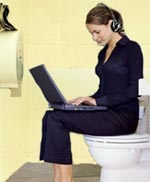 |
|
Toilet Breaks Remain Workplace Issue
Many of us are being short-changed by our employers when it comes to the call of nature.
According to new research published by the Labour Research Department (LRD), many British workers are suffering because of inadequate toilet facilities and restrictive toilet break rules. This can have significant consequences for people's health, as well as hygiene, privacy and dignity at work.
 LRD surveyed unionised workplaces and found that the transport sector was particularly badly affected, along with industries such as mining, construction and quarrying. Bus drivers, for example, struggled to find time between routes to use the loo, and complained of a lack of public toilets in many cities. Those with health problems such as irritable bowel syndrome experienced particular difficulties. While most office workers did not experience problems, there were still some areas - for example call centres - where restrictive practices and surveillance meant that workers could be penalised for taking time off to go to the loo. LRD surveyed unionised workplaces and found that the transport sector was particularly badly affected, along with industries such as mining, construction and quarrying. Bus drivers, for example, struggled to find time between routes to use the loo, and complained of a lack of public toilets in many cities. Those with health problems such as irritable bowel syndrome experienced particular difficulties. While most office workers did not experience problems, there were still some areas - for example call centres - where restrictive practices and surveillance meant that workers could be penalised for taking time off to go to the loo.
One call centre gave workers in teams a wooden spoon. To go to the toilet, a worker had to take the spoon. If someone else already had the spoon in their team, no one else was allowed to go. In other places, employers attempt to dock wages for time not on the production line, or - as in some meat industry plants - refuse to let workers off the production line to use the toilet during shifts lasting up to four hours.
Facilities can also be poor. In one of the worst examples - fortunately now resolved - caretakers at a housing association had access only to a bucket in a damp washroom area.
"For most workers, toilet breaks are not an issue: they go when they need to and that's that," said LRD researcher Dave Statham. "But for some, the situation is not so simple, and the consequences can be unpleasant, unhealthy and humiliating. Employers in all industries need to realise that staff need proper access to clean facilities, and to be able to go when they need to without harassment or loss of pay."
Other issues included disabled access, lone working, requiring permission to go to the loo, insufficient break time, and unhygienic facilities.
Source: LRD
|
|
|
Designed, Hosted and Maintained by Union Safety Services
|